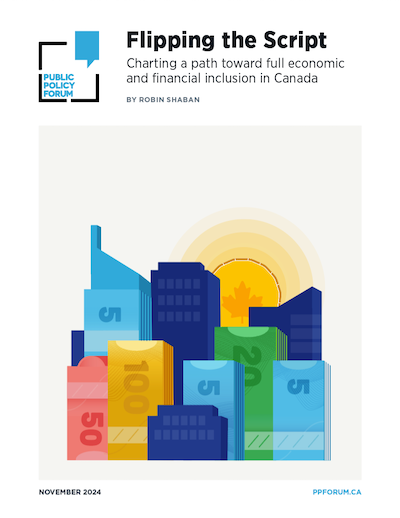
Flipping the Script
Charting a path toward full economic and financial inclusion in Canada
Executive Summary
Within our liberal-democratic society, everyone is entitled to economic opportunities that meet basic material needs and provide a pathway to wealth accumulation — having more than what is needed to merely survive.
Open access to participation in an economy is fundamental to economic and financial inclusion. With it comes empowerment, freedom and a responsibility to contribute to the best of one’s abilities. In other words, the social bargain that underlies successful societies.
But the reality is a startling number of people don’t enjoy this economic access. Based on data from Financial Resilience Institute’s October 2023 Financial Well-Being Study and October 2023 Seymour Financial Resilience Index® more than six million people in Canada face barriers to making money and are currently unable to reach their full potential. It represents an enormous failure — and an ever bigger lost opportunity — for the Canadian economy.
Despite the vast number of government initiatives to bolster inclusion, economic and financial exclusion remain. By ensuring significant numbers of Canadians are able to fully participate in the economy, Canada’s GDP could be boosted by as much as 10 percent. It could also strengthen the economy’s ability to withstand shocks and downturns, help solve Canada’s lagging productivity and innovation, and reduce the number of people facing financial hardship. Ignoring the problem leaves billions of dollars on the table.
This report is the culmination of a three-year Public Policy Forum research and engagement initiative, All-In: Pathways to Economic and Financial Inclusion for Canada. A core finding of this work is that systemic barriers and discrimination are core drivers of economic and financial exclusion in Canada. Policies to address this must aim to dismantle barriers, disincentivize discrimination and support people in overcoming challenges.
This work aims to step outside of current debates and traditional thinking by taking a long-term and economic-focused look at the issue, examining what happens if inclusion is either ignored or embraced.
Building from the body of research developed throughout this project, we undertook a foresight analysis that envisions three possible futures for Canada in the year 2040:
- A future where economic and financial inclusion is in decline;
- A scenario of incremental improvement in the state of economic and financial inclusion; and
- A scenario of transformational change in Canadian society that enables full economic and financial inclusion.
Building on insights of the foresight analysis, original research and consultations with experts, we present three broad recommendations to policymakers:
1. It’s time to ‘flip the script’ on inclusion and economic policy
To achieve the transformative state of full economic and financial inclusion — and realize the enormous gains that come from it — we need a fundamental paradigm shift in how we understand the relationship between inclusion and economic prosperity, and by extension our overall approach to economic policymaking.
Economic prosperity is not a pre-condition for economic inclusion and opportunity for all. Economic inclusion is a fundamental engine of our collective prosperity and must be a key pillar of policy in Canada.
In practical terms, this means that policy-makers must integrate an inclusion lens into policies that aim to enhance innovation, productivity and economic growth.
2. Make labour markets competitive
Flipping the script will involve examining things that have been ignored as factors in economic inclusion. At the top of the list: oversight of labour markets. Specifically, the Competition Bureau should turn its attention to addressing labour markets. Studies show that robust market competition curbs discrimination, as companies thrive when they hire the most talented candidates. This is something that policymakers in competition law have, historically, failed to consider.
To address this shortcoming, the Bureau should develop enforcement guidelines that outline how it plans to enforce the Competition Act in labour markets in the same way that it currently has enforcement guidelines around mergers and abuses of dominance. As part of these guidelines, the Bureau should consider and research the role of employer discrimination as an anti-competitive strategy to suppress wages.
3. Help people enhance their identity capital
Economic growth requires that people have high levels of identity capital — the tangible and intangible resources a person needs to make major life transitions. This was a key finding of our All-In Phase 2 Report.
Policymakers should integrate the concept and theory of identity capital into social policies and programs.
Reforming primary education curricula, for instance, is a critical channel for fostering greater identity capital. Instilling further in children self-esteem, a sense of purpose in life, critical thinking and reasoning skills and confidence in one’s ability to overcome challenges is fundamental to fostering greater identity capital.
To support adults in cultivating greater identity capital, policymakers can consider reforms to provincial social assistance programs. Employment training can be leveraged to support people in building stronger confidence, self-esteem and other aspects of identity capital.
This paper would not have been possible without the generous participation of the Advisory Council members and other focus group participants, whom we sincerely thank for their invaluable inputs and insightful conversations. We would also like to extend our gratitude to Ron Memmel, foresight specialist, and Eloise Duncan, CEO and Founder of Financial Resilience Institute for their valuable contributions.








